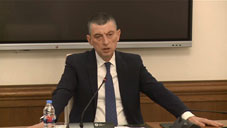
Giorgi Gakharia Testifies Before Georgian Dream's Investigative Commission
By Liza Mchedlidze
Tuesday, April 15, 2025
Giorgi Gakharia, former Prime Minister of Georgia (2019-2021) and current leader of the opposition For Georgia party, appeared before the temporary investigative commission on June 10. The commission, officially tasked with probing alleged crimes by the United National Movement (UNM), questioned Gakharia on key events during his tenure, including the violent crackdown on protesters during the 2019 "Gavrilov's Night" and the controversial Chorchana checkpoint incident.
Gakharia's decision to testify set him apart from other opposition leaders, many of whom have refused to engage with what they consider an illegitimate, GD-dominated parliament. His party, For Georgia, is the only opposition force that has not formally resigned its parliamentary seats, though it does not recognize the legislature's legitimacy.
Commission chair Tea Tsulukiani greeted him with a pointed remark: "Thank you for coming. It seems you have recognized the Georgian Parliament and the credentials of our deputies." Gakharia fired back, accusing the commission of waging a "hybrid war" against Georgian citizens.
"I see that you are using this commission for information and psychological pressure," he said, adding that his presence did not imply recognition of the body's legitimacy. He cited Tsulukiani's earlier dismissal of war hero Giorgi Antsukhelidze's death as a "senseless" PR stunt by Mikheil Saakashvili as a key reason for his appearance.
The hearing's most heated exchanges revolved around the June 20-21, 2019, protests, when riot police violently dispersed demonstrators angered by Russian MP Sergei Gavrilov's address from the parliamentary speaker's seat. The European Court of Human Rights later ruled that Georgia failed to properly investigate police brutality.
Gakharia admitted authorizing tear gas and water cannons but denied ordering rubber bullets, which were fired at close range, blinding several protesters. When pressed on who gave the command, he suggested officers may have acted independently in "self-defense."
"Once I learned rubber bullets were used, I restricted their use to situations where officers' lives were at risk," he said.
GD MPs contrasted his handling of the 2019 protests with the current government's response to anti-government demonstrations, praising Interior Minister Vakhtang Gomelauri.
Tsulukiani argued Gakharia should have resigned after protesters were injured. He countered that responsibility lay with those who invited Gavrilov, including GD chair Irakli Kobakhidze. "You've asked no questions about how Gavrilov arrived in Georgia?" he challenged. He also revealed receiving pressure from parliament to allow Gavrilov and other controversial figures into the country but did not name specific officials.
The commission revisited the 2019 Chorchana checkpoint crisis, when Georgian authorities established a police post near the South Ossetian occupation line. Tskhinvali responded with an ultimatum, threatening retaliation.
Gakharia defended the decision, citing deteriorating roads, new Russian-backed "border signs," and Georgian detentions in the area. He claimed the move was coordinated with the EU Monitoring Mission (EUMM) and relevant ministries.
Aleksandre Tabatadze, then-deputy head of the State Security Service (SSSG), disputed this, stating the SSSG was "categorically against" the checkpoint. Tsulukiani dismissed Gakharia's explanation as lies, accusing him of bypassing protocol.
Gakharia retorted: "Did we coordinate with anyone before apologizing to the occupiers?" - a jab at Bidzina Ivanishvili's 2024 suggestion that Georgia apologize to Ossetians for the 2008 war.
When Tsulukiani claimed the checkpoint backfired by prompting further Russian encroachment, Gakharia sarcastically replied: "At the pace you're going, soon you'll be blaming me for starting a war."
The hearing concluded with questions about Gakharia's 2021 resignation, which came days before opposition leader Nika Melia's arrest. Gakharia stated that he had opposed Melia's detention, citing risks of escalation.
At the commission, he called Melia a "hooligan politician" who deserved arrest but argued it should have been handled differently to avoid later amnesty. Tsulukiani insinuated foreign pressure influenced his resignation, asking which ambassadors he met before stepping down.
After Gakharia could not recall names, she pressed: "Did you meet the U.S. Ambassador?" He confirmed but denied any suggestion that he was "secured in the opposition."
"The U.S. Ambassador can say whatever she wants, but the Prime Minister of Georgia makes decisions based on Georgian law," he said. He attributed his resignation to Bidzina Ivanishvili's shadow governance, claiming that despite Ivanishvili's public exit from politics, he "took over the decision-making process."

